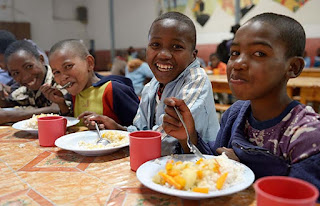THE MESSAGE OF THE RECTOR MAJOR
Fr. Angel Fernandez Artime
DON BOSCO WOULD DO THE SAME
“Imagining my Salesian confrere being a friend, a brother, and a father to them, waiting until that very late hour for the young man returning from work and offering him to join himself and two other educators for dinner, truly touched my heart. Again, I said to myself: Don Bosco would do the same.”
My good friends who read Salesian media and all friends of Don Bosco’s charism, I am writing to you from Quito, Ecuador, a Salesian province that is distinguished for its mission among the original Ashuar and Achuar peoples, as well as for its educational outreach to the most disadvantaged boys rescued from the streets.
In a meeting with a Salesian from Peru, I had the great joy of hearing about a work that profoundly impresses the following thought upon my heart: DON BOSCO WOULD HAVE DONE THE SAME.
The story of this new Salesian presence in Lima, Peru, is what I want to share with you.
The house into which these young people and families are received (and later you will see why I also say families) is called Casa Don Bosco. Since 2018, they have welcomed young immigrants and refugees. The work began with the reception of five boys, all still minors, who had arrived at the Salesian house from Venezuela without papers. They were living on the streets of Lima, trying to survive. Then they received the invitation to go to Don Bosco’s House. As I listened to Father tell this story, I thought, “This is the same path that Don Bosco took in Valdocco at the beginning of the Oratory in the little Pinardi house.”
A different house, a different life
It was in this house that those boys began their “different life” in Lima. Since then, more than 600 young people have passed through that house until they were able to find a stable situation. Currently, 47 live in the house; seven of them are already young adults who have families or young wives whom they have brought with them.
The young people make contact with Casa Don Bosco, which is becoming better and better known, since they spread the word among themselves. Those who wish to live there share life with other young people, their educators, and the Salesian who accompanies the project and follows up on day-to-day life in the house. This Salesian also follows each of the young people during the day until the last ones arrive home, who are often those who work in the hotel business. At the end of their workday, around 1:00 a.m., they come to Don Bosco’s House to get some rest. Imagining my Salesian confrere being a friend, a brother, and a father to them, waiting until that very late hour for the young man returning from work and inviting him to join himself and two other educators for dinner, truly touched my heart. Again, I said to myself: Don Bosco would do the same.
They also help these boys prepare necessary documents and receive psychological help from volunteer psychologists and some training. Those who are most suited to it are also offered the possibility to start a job so they can earn an honest living. These young people come from the most diverse situations and have experienced the most varied forms of violence. They are from all different religions or have no religious affiliation at all. The only important thing is that they are young people who need help. That is the only documentation they need to present. Everything else will sort itself out.
A motorcycle for the future
Some of them have found work in the following way: with the help of Missioni Don Bosco of Turin and the Mission Office of Bonn, Germany, 20 motorcycles were purchased and offered to those young people who found work as delivery men. The motorcycle is not just given to them. They borrow it, paying for it little-by-little over time from what they save from their salaries. These payments then allow others to be purchased so that newcomers also may find a job. I liked this creative response to this emergency situation.
I think that is a great way to get these young people away from the dangers of drug addiction. Actually, many of them had already been using some type of narcotic. Casa Don Bosco helps them get away from it altogether.
There is still something else that I found precious. It turns out that several of these young men left their young wives, sometimes with babies, in their country. Fortunately, by taking advantage of the fact that the house is large, seven of these young couples have their own room where their families have been able to get together and have a small home. Here the young couples share some common space, such as the kitchen and dining room. They, too, are accompanied by their educators and the Salesian confrere who runs the project on behalf of the nearby Salesian community to which he belongs.
The important thing is that the Casa Don Bosco in Magdalena del Mar in Lima for immigrants and refugees is changing the lives of many young people or very young married couples for the better. Perhaps realities such as this one are not always discussed in the news. Perhaps we “feed” daily on terrible and hard-to-take news, but the good that is sown every day also exists. It is that good that must be shared and made known.
Thank you, dear friends, for also welcoming this good news with big hearts. I remain convinced that Don Bosco would be doing the same today.
I
wish you all the best.
Fr.
Angel






















